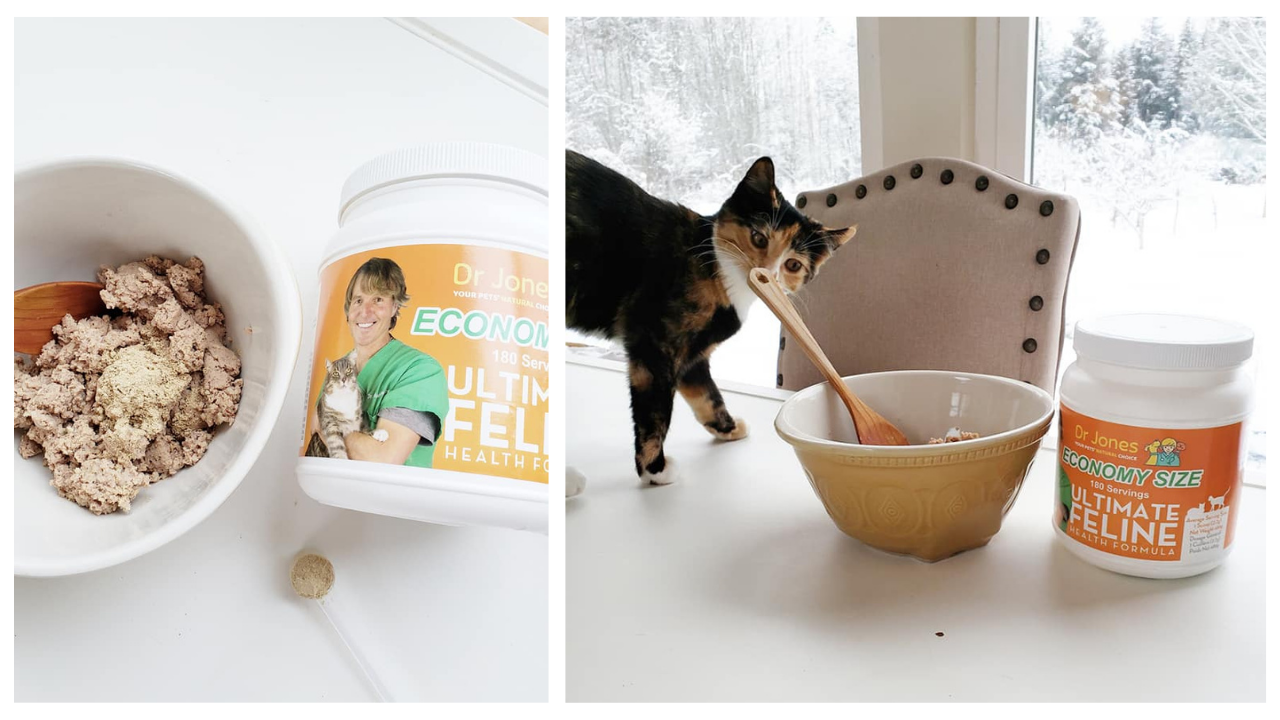7 Proven Ways to Keep Your Aging Cat Healthy and Happy
![]()

Is your senior cat slowing down, losing that sparkle, or showing signs of discomfort? Don’t worry—aging doesn’t have to mean declining health. With the right care, nutrition, and a few simple adjustments, you can help your feline friend stay active, happy, and healthy well into their golden years.
In my latest guide, I share 7 simple steps to keep your aging cat thriving—from upgrading their diet and preventing disease, to tackling common senior issues like arthritis and dental problems. These practical tips are easy to follow and make a real difference in your cat’s quality of life.
And to give your cat an extra boost, my ULTIMATE Feline Health Formula is packed with antioxidants, joint support, and kidney-protecting ingredients—everything your senior cat needs to stay vibrant and thriving.
Grab your bottle today and help your cat enjoy their golden years to the fullest!


7 Simple Steps to Keep Your Aging Cat Thriving
It’s Happy Cat Month, so this one’s for all of us cat lovers!
I now have a happy cat, but I want to make sure he stays healthy as he ages. And the truth is—yes, you can make a real difference in your senior cat’s life.
From nutrition to supplements, environment to preventive care, there are several simple strategies that can help your cat stay active, healthy, and happy well into their golden years.

Let’s dive into my 7 simple steps to keep your aging cat thriving.
1. Upgrade Their Diet
Your cat’s diet is the foundation of their health. Many cats are fed dry, carbohydrate-heavy kibble—low in moisture and protein—which is linked to diabetes, kidney disease, and urinary tract infections. Certain proteins, like soy, are even linked to hyperthyroid disease.
Why it matters: Chronic kidney disease (CKD) is strongly influenced by diet—especially low moisture and high phosphorus content. Repeated urinary tract issues? Often diet-related too.
Actionable Tip:
-
Switch to a high-protein, moisture-rich canned food or home-prepared diet focused on animal proteins.
-
Ensure fresh water is always available—consider a cat water fountain to entice them to drink more.
My ULTIMATE Feline Health Formula is designed to complement a healthy diet: it has added antioxidants and no phosphorus. The calcium in the formula even binds phosphorus in the diet, helping protect your cat’s kidneys.
Click here to get your bottle!
2. Say No to Unnecessary Vaccines
Older cats don’t always need frequent vaccines. Over-vaccination can sometimes contribute to kidney problems and, in rare cases, even cancer.
My advice: Cats over 3 years old often don’t require extra vaccines. Instead, focus on keeping them healthy overall.
3. Opt for Holistic Alternatives
Many conventional medications can stress a senior cat’s system. NSAIDs, like meloxicam, are commonly prescribed for pain, but some cats cannot tolerate them—they may develop kidney or liver issues.
Natural choices:
-
Pain relief: Try CBD instead of NSAIDs.
-
Flea prevention: Consider diatomaceous earth, a natural and safe option.
Even one dose too many of the wrong drug can have serious consequences, so always consider gentle, holistic alternatives first.

4. Enhance Their Environment
Senior cats thrive in low-stress, enriched environments. Stress is a major factor in urinary tract disease and other health problems.
Quick wins:
-
Provide toys and scratching posts or pads.
-
Spend quality time grooming your cat.
-
Keep their environment calm and predictable.
Even a simple low scratching pad can make a big difference for older cats.
5. Prevent Disease Before It Starts
Kidney disease affects roughly 30% of cats over 15. Diet is a huge factor—especially phosphorus and moisture levels. Fish-based diets are high in phosphorus, which can accelerate kidney damage.
Preventive tips:
-
Avoid fish-heavy foods; go for poultry-based protein.
-
Add a phosphorus binder like calcium carbonate (ground eggshell) to their diet: ¼ teaspoon per 10 lbs of body weight daily.
-
My ULTIMATE Feline Health Formula has added calcium and no phosphorus, making it an easy, effective way to reduce kidney strain.
6. Tackle Common Senior Cat Issues
Dental disease and arthritis are widespread in older cats.
Dental check: Lift your cat’s lips to check gums and teeth:
-
Healthy gums: soft pink above the tooth line
-
Red = gingivitis, yellow = plaque, then tartar
Arthritis: As cartilage wears down, bones rub, causing inflammation and discomfort.
Solutions:
-
Propolis (Bee Glue): Apply a small squirt along the gum line daily to reduce inflammation.
-
Supplements: Glucosamine, chondroitin, and MSM—all included in ULTIMATE Feline Health Formula—support joint health.
7. Be an Engaged Cat Parent
Stay informed, proactive, and don’t be afraid to ask questions. Question vaccinations, medications, and supplements to ensure your cat gets the best care without unnecessary risks.
Pro tip: Natural immune boosters like colostrum can strengthen your cat’s immunity without needing annual vaccines.
The Bottom Line
Caring for a senior cat takes effort, but the rewards are incredible. With the right diet, supplements, environment, and preventive care, your cat can stay healthy, happy, and active for years to come.
Click To Get A Free Copy of My E-Book!

P.S. Happy National Happy Cat Month! Celebrate your cat and their golden years.
P.P.S. My ULTIMATE Feline Health Formula:
-
Added antioxidants
-
Lowers kidney-damaging phosphorus
-
Supports joints, immunity, and overall health
It’s here to help your senior cat thrive!
And to give your cat an extra boost, my ULTIMATE Feline Health Formula is packed with antioxidants, joint support, and kidney-protecting ingredients—everything your senior cat needs to stay vibrant and thriving.
Grab your bottle today and help your cat enjoy their golden years to the fullest!











I love the ultimate feline supplement. However, I would like to know the signs of renal failure in cats. I just lost one of my formerly feral cats, 4 years old, who became very thin pretty quickly. I can’t afford a vet bill but would like to know what the signs of kidney disease are and is there a cure?
Signs of kidney failure in cats include increased thirst and urination, weight loss, decreased appetite, lethargy, vomiting, and poor coat condition. In advanced stages, symptoms may worsen with bad breath, dehydration, and weakness. While there’s no cure for chronic kidney disease, early detection and management with special diets, fluids, and medications can improve quality of life and slow progression.